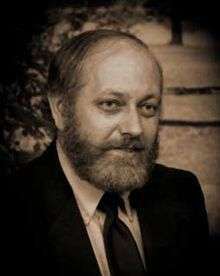Bob Bledsaw
Robert Eugene Bledsaw (May 18, 1942[2] – April 19, 2008) was the founder of the role-playing game publisher Judges Guild.
Bob Bledsaw | |
|---|---|
 | |
| Born | May 18, 1942[1] Decatur, Illinois |
| Died | April 19, 2008 (aged 65)[1] |
| Resting place | Graceland Cemetery (Decatur, Illinois) |
| Nationality | United States |
Early life and education
Bob Bledsaw was born May 18, 1942, in Decatur, Illinois, and was the son of Walter and Dorothy Bledsaw.[1] He graduated from Lakeview High School and Richland Community College and attended Millikin University.[1] He was employed as an engineer by A.W. Cash, Grigoleit, Essex Wire, General Electric and Zexel Illinois, contributing to the development of quadraphonic sound systems.[1]
Career
In 1975, Bob Bledsaw began to run a campaign using the original Dungeons & Dragons rules, after being asked for help by Bill Owen and a group of other friends who had unsuccessfully tried to run the game four times; he started his adventure in a fantasy campaign set in Middle-earth, but moved the campaign to a realm of his own design - the City State of the Invincible Overlord - rather than sacrifice the integrity of Tolkien's world.[3]:65 When Bledsaw was laid off from his job at General Electric in 1975, he decided to form a company to create supplements for D&D players, and with Bill Owen he went to seek permission from TSR.[3]:65 Bledsaw and Owen showed their City-State material to Dave Arneson, Gary Gygax, and other TSR staff, who told them they could publish supplements to D&D if they wanted to.[3]:65 With this casual licensing agreement, they created a large map of Bledsaw's City-State, first selling copies of the map and subscriptions to Judges Guild's bimonthly play aids publication.[3]:65 In 1976, with partner Bill Owen he founded The Judges Guild Game Co., which manufactured role-playing games and supplies.[1]
Bledsaw and Owen became full-time employees of Judges Guild in 1977; Owen was also working full-time for his family business, so he left Judges Guild in the fall of 1977 and sold his shares to Bledsaw.[3]:66 By spring of 1978, Judges Guild left Bledsaw's living room and moved to a real office.[3]:66 Bledsaw hoped to use his connection with Chuck Anshell - who was friends with one of J.R.R. Tolkien's sons - to acquire a license to Middle-earth, but waited too long out of respect for Tolkien's passing in 1973, and thus Iron Crown Enterprises got the license instead.[3]:67 In 1978 Bledsaw sent Gary Gygax hundreds of pages of notes about campaigns, some of which was incorporated into the original Dungeon Masters Guide as appendices.[3]:67 When TSR started publishing their own adventures in 1978 beginning with the G-series, the D-series, and Tomb of Horrors, Bledsaw felt this was in violation of TSR's previous agreement with Judges Guild.[3]:67 By 1985, Judges Guild had stopped publishing new material after several distributors and retailers went out of business owing Judges Guild money.[3]:68–69
Early in 1999, Judges Guild - led by Bob Bledsaw - returned on the internet at judgesguild.com, and began selling original Judges Guild products which had been warehoused for 15 years, and also started taking new subscriptions for Pegasus magazine.[3]:70 Bledsaw and James Mishler formed a new company called Adventure Games Publishing.[3]:70
Bob Bledsaw died on April 19, 2008, from cancer.[1] Bob Bledsaw II took over Judges Guild, which published Lost Man's Trail (2010) as Bob Bledsaw's final contribution to the world of the Wilderlands.[3]:70
References
- http://www.legacy.com/obituaries/herald-review/obituary.aspx?n=robert-e-bledsaw&pid=108125363
- "United States Social Security Death Index," index, FamilySearch (https://familysearch.org/pal:/MM9.1.1/JTJ7-H62 : accessed 12 Feb 2013), Robert E Bledsaw, 19 April 2008; citing U.S. Social Security Administration, Death Master File, database (Alexandria, Virginia: National Technical Information Service, ongoing).
- Shannon Appelcline (2011). Designers & Dragons. Mongoose Publishing. ISBN 978-1-907702-58-7.